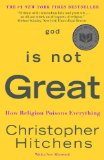Summary | Excerpt | Reading Guide | Reviews | Readalikes | Genres & Themes | Author Bio

Critics' Opinion:
Readers' Opinion:
First Published:
May 2007, 307 pages
Paperback:
Apr 2009, 272 pages
Putting It Mildly
If the intended reader of this book should want to go beyond disagreement with its author and try to identify the sins and deformities that animated him to write it (and I have certainly noticed that those who publicly affirm charity and compassion and forgiveness are often inclined to take this course), then he or she will not just be quarreling with the unknowable and ineffable creator who—presumably—opted to make me this way. They will be defiling the memory of a good, sincere, simple woman, of stable and decent faith, named Mrs. Jean Watts.
It was Mrs. Watts’s task, when I was a boy of about nine and attending a school on the edge of Dartmoor, in southwestern England, to instruct me in lessons about nature, and also about scripture. She would take me and my fellows on walks, in an especially lovely part of my beautiful country of birth, and teach us to tell the different birds, trees, and plants from one another. The amazing variety to be found in a hedgerow; the wonder of a clutch of eggs found in an intricate nest; the way that if the nettles stung your legs (we had to wear shorts) there would be a soothing dock leaf planted near to hand: all this has stayed in my mind, just like the “gamekeeper’s museum,” where the local peasantry would display the corpses of rats, weasels, and other vermin and predators, presumably supplied by some less kindly deity. If you read John Clare’s imperishable rural poems you will catch the music of what I mean to convey.
At later lessons we would be given a printed slip of paper entitled “Search the Scriptures,” which was sent to the school by whatever national authority supervised the teaching of religion. (This, along with daily prayer services, was compulsory and enforced by the state.) The slip would contain a single verse from the Old or New Testament, and the assignment was to look up the verse and then to tell the class or the teacher, orally or in writing, what the story and the moral was. I used to love this exercise, and even to excel at it so that (like Bertie Wooster) I frequently passed “top” in scripture class. It was my first introduction to practical and textual criticism. I would read all the chapters that led up to the verse, and all the ones that followed it, to be sure that I had got the “point” of the original clue. I can still do this, greatly to the annoyance of some of my enemies, and still have respect for those whose style is sometimes dismissed as “merely” Talmudic, or Koranic, or “fundamentalist.” This is good and necessary mental and literary training.
However, there came a day when poor, dear Mrs. Watts overreached herself. Seeking ambitiously to fuse her two roles as nature instructor and Bible teacher, she said, “So you see, children, how powerful and generous God is. He has made all the trees and grass to be green, which is exactly the color that is most restful to our eyes. Imagine if instead, the vegetation was all purple, or orange, how awful that would be.”
And now behold what this pious old trout hath wrought. I liked Mrs. Watts: she was an affectionate and childless widow who had a friendly old sheepdog who really was named Rover, and she would invite us for sweets and treats after hours to her slightly ramshackle old house near the railway line. If Satan chose her to tempt me into error he was much more inventive than the subtle serpent in the Garden of Eden. She never raised her voice or offered violence — which couldn’t be said for all my teachers — and in general was one of those people, of the sort whose memorial is in Middlemarch, of whom it may be said that if “things are not so ill with you and me as they might have been,” this is “half-owing to the number who lived faithfully a hidden life, and rest in unvisited tombs.”
Copyright © 2007 by Christopher Hitchens





The Funeral Cryer by Wenyan Lu
Debut novelist Wenyan Lu brings us this witty yet profound story about one woman's midlife reawakening in contemporary rural China.
Your guide toexceptional books
BookBrowse seeks out and recommends the best in contemporary fiction and nonfiction—books that not only engage and entertain but also deepen our understanding of ourselves and the world around us.